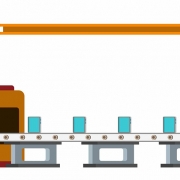Ten technologies that are transforming industrial production (Part II)
We face the second and last part about the ten technologies that are transforming industrial production. A review of what is today a reality in the field of Industry 4.0. New emerging technologies often overlap in scope and application as they are designed to fully integrate with one another to produce a cohesive manufacturing unit. Next, we are going to detail which are the five latest technological advances that are making it possible for Industry 4.0 to be imposed in the current scenario.
Machine learning
It is one of the most important technology drivers for Industry 4.0, making data collection and storage simple and inexpensive. Not only that, but smart machines can self-analyze data to create higher-quality products at lower costs – the most important goal in manufacturing.
Likewise, machine learning together with Artificial Intelligence increases productivity, increases product quality and guarantees the safety of employees.
Hybrid manufacturing
Hybrid manufacturing refers to the combination of two technologies that work in unison within a manufacturing environment: additive manufacturing or 3D printing and subtractive manufacturing or computerized numerical control (CNC) milling.
3D printing is used for the construction phase of a production, while CNC milling is used to fabricate and polish the final product.
The main benefit of using these two technologies together is a more unified and precise manufacturing environment where greater design freedom can efficiently create intricate and flexible parts, no matter how complex the designs are. Additionally, hybrid manufacturing brings benefits such as reduced processing times, ease of inspection, fewer production resources, and freedom of design and precision.
Distributed Ledger Technology (DLT)
Distributed ledgers are made up of databases that are spread across a wide range of locations to make the transparency of transactions clearer and thus make it more difficult for cyberattacks to occur as each transaction is publicly observed in a synchronized network.
In addition to the central transactions made through the synchronized databases, any changes made to the general ledger will be noted and distributed to all interested parties in a matter of moments.
All interested parties are kept informed of what is happening at all times. Blockchain, the main technology behind the famous cryptocurrency Bitcoin, is an example of DLT.
DLT will be the driving force behind all the technologies that will increasingly drive Industry 4.0. The reason is that by keeping the entire manufacturing process traceable and transparent, production becomes cheaper, faster and safer.
Using DLT increases the visibility of all areas of the manufacturing process, increasing the efficiency of the entire supply chain. Increased manufacturing visibility across all areas of manufacturing, starting with suppliers and ending with delivery to the customer, yields benefits such as improved supplier order accuracy, greater traceability, faster lead times, and quality of improved product.

Machine-to-machine communication (M2M)
Machine-to-machine (M2M) communication is the collection of data from machinery through electronic sensors for the transfer of such data over networks to special software that can accurately interpret it.
The transfer of data between machines and software becomes the product of human evaluation or direct imperatives that are transferred directly to other machines and processes to complete their tasks.
The M2M method and technology are the cornerstones of Manufacturing 4.0, as the amount of data collected in today’s manufacturing facilities is often too large to interpret using traditional data collection and analysis methods and tools.
Some major production areas that can be made more efficient and transparent through the use of M2M technology are inventory management, job scheduling, line availability, sequence of operations, and maintenance and reliability of production equipment.
Cybersecurity
Although Industry 4.0 technology has changed the entire manufacturing landscape for the better, it has also brought with it some exposure issues that need to be addressed. As technology plays a major role in manufacturing, so is the potential for cyberattacks to occur.
Smart manufacturing plants must make it a priority to protect their data, processes, systems and networks with cybersecurity technology. And to build a system as effective as possible against these attacks, the most appropriate thing is to have the services of a specialized IT consultant such as HEXA Ingenieros.









